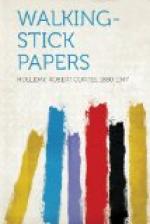XXII
READING AFTER THIRTY
Somewhere in the mass of that splendid, highly personal journalism of his, William Hazlitt declares that he was never able to read a book through after thirty. That penetrating man, Samuel Butler, reflecting in his “Note-Books” on “What Audience to Write For,” says: “People between the ages of twenty and thirty read a good deal, after thirty their reading drops off and by forty is confined to each person’s special subject, newspapers and magazines.” Thirty again, you see.
We all have friends who have been omniverous readers, persons who, to our admiration and despair, seem to have read everything in “literature.” It may have struck us, however, as a curious thing that, except possibly in rare instances, such persons appear not to read much now, beyond newspapers and magazines. The upshot of what they are able to say, when you ask them why this is true, is that one simply reaches a time of life when one “quits reading,” as one ceases to dance, or cools in interest toward the latest fashions in overcoats.
But, undoubtedly there are persons who continue to read, apparently with unabated industry and zest, no matter how old they may become. Dr. Johnson, of course, was a constant reader all his life, and would cheerfully read anything whether it was readable or not. Though did not he somewhere confess to himself that he did not read things through? Mr. Huneker, who is well on the richer side of thirty, would seem to read everything printed about five minutes after it has left the press, and before anybody else has had a chance to see it. There are so many capital letters on the pages of his own books that it makes one dizzy to look at them. Whether or not he reads through all the books he mentions is of course (as he is a reviewer) a question. And, then, both Mr. Huneker and the Doctor belong to the trade, so to say. Another startlingly prodigious reader is Theodore Roosevelt, hilariously past thirty, and not exclusively identified with literary “shop.” He is continually discovering and vigorously recommending new poets and short-story writers whom professional critics have not yet had time to get around to. It does not appear that a fundamental or organic change in the composition of the human brain which inhibits reading occurs more or less suddenly at thirty.
Why then do so many reading animals cease at about that time to read? Butler does not say. Arnold Bennett (was it not?) has asked what’s the use of his reading more, he knows enough. Hazlitt, in his own case, surmised that the keener interest of writing rather asphyxiated the impulse to read. And, doubtless, that generally is about the size of it. As in the cure of the drink habit, a new and more intense interest will drive out the old. The reader, of course, is a spectator, not an active participant in the world’s doings.




